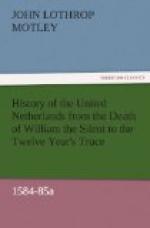Accordingly, on the last day of the year 1584, a secret treaty had been signed at Joinville between Henry of Guise and his brother the Duc de Mayenne, holding the proxies of their brother the Cardinal and those of their uncles, Aumale and Elbeuf, on the one part, and John Baptist Tassis and Commander Moreo, on the other, as representatives of Philip. This transaction, sufficiently well known now to the most superficial student of history, was a profound mystery then, so far as regarded the action of the Spanish king. It was not a secret, however, that the papistical party did not intend that the Bearnese prince should ever come to the throne, and the matter of the succession was discussed, precisely as if the throne had been vacant.
It was decided that Charles, paternal uncle to Henry of Navarre, commonly called the Cardinal Bourbon, should be considered successor to the crown, in place of Henry, whose claim was forfeited by heresy. Moreover, a great deal of superfluous money and learning was expended in ordering some elaborate legal arguments to be prepared by venal jurisconsults, proving not only that the uncle ought to succeed before the nephew, but that neither the one nor the other had any claim to succeed at all. The pea having thus been employed to do the work which the sword alone could accomplish, the poor old Cardinal was now formally established by the Guise faction as presumptive heir to the crown.
A man of straw, a superannuated court-dangler, a credulous trifler, but an earnest Papist as his brother Antony had been, sixty-six years old, and feeble beyond his years, who, his life long, had never achieved one manly action, and had now one foot in the grave; this was the puppet placed in the saddle to run a tilt against the Bearnese, the man with foot ever in the stirrup, with sword rarely in its sheath.
The contracting parties at Joinville agreed that the Cardinal should succeed on the death of the reigning king, and that no heretic should ever ascend the throne, or hold the meanest office in the kingdom. They agreed further that all heretics should be “exterminated” without distinction throughout France and the Netherlands. In order to procure the necessary reforms among the clergy, the council of Trent was to be fully carried into effect. Philip pledged himself to furnish at least fifty thousand crowns monthly, for the advancement of this Holy League, as it was denominated, and as much more as should prove necessary. The sums advanced were to be repaid by the Cardinal on his succeeding to the throne. All the great officers of the crown, lords and gentlemen, cities, chapters, and universities, all Catholics, in short, in the kingdom, were deemed to be included in the league. If any foreign Catholic prince desired to enter the union, he should be admitted with the consent of both parties. Neither his Catholic majesty nor the confederated princes should treat with the most Christian King, either directly or indirectly. The compact was to remain strictly secret—one copy of it being sent to Philip, while the other was to be retained by Cardinal Bourbon and his fellow leaguers.




